VIDEO BLOG
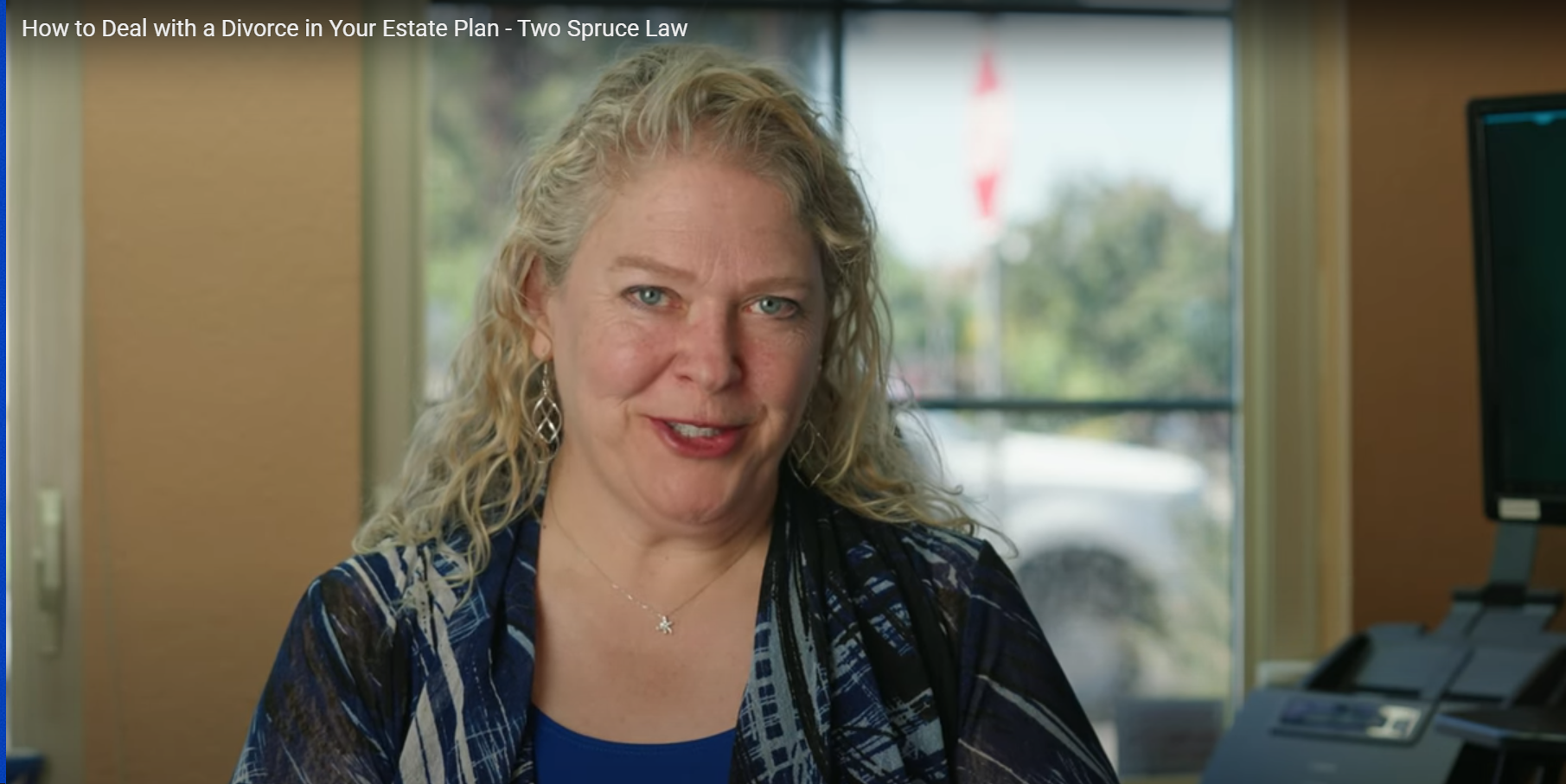
How to Deal with a Divorce in Your Estate Plan - Two Spruce Law
By Patricia Louise Nelson of Two Spruce Law
There are a couple of times you when being divorced and being in the process of getting divorce justifies updating your estate plan. One situation is if you are getting divorced and you want to avoid your soon-to-be-ex-spouse from receiving any of your assets. The other situation is if you get divorced after putting in place an estate plan that benefits your former spouse.
During the process of divorcing, you are allowed to prepare a new estate plan intentionally giving your spouse nothing, if you are no longer living together as a married couple. If you need to live together as a couple, your soon-to-be-former spouse is entitled to an “elective share” under Oregon law. The elective share is a portion of your assets. It is a sliding scale, which depends on the length of the marriage. The longer the marriage, the higher percent of your assets to which your spouse is entitled. Give us a call so we can help you figure out how the Oregon elective share impacts your situation. Of course, if you have a prenuptial agreement, you are likely allowed to leave nothing to your former spouse, depending on the terms of the prenuptial agreement.
The second situation is if you get divorced after your estate plan is in place. In this situation, the provisions in the estate plan naming the now-former spouse as a fiduciary or giving the now-former spouse assets are revoked by the divorce process. The estate planning documents do not need to be changed unless you want some other terms changed – the spouse is removed by the divorce paperwork. Often, the estate plan needs to be updated for other reasons, so if you are not sure then call us to discuss the terms of your estate plan in light of your divorce.
Find out more at: https://twosprucelaw.com/videos/how-to-deal-with-a-divorce-in-your-estate-plan
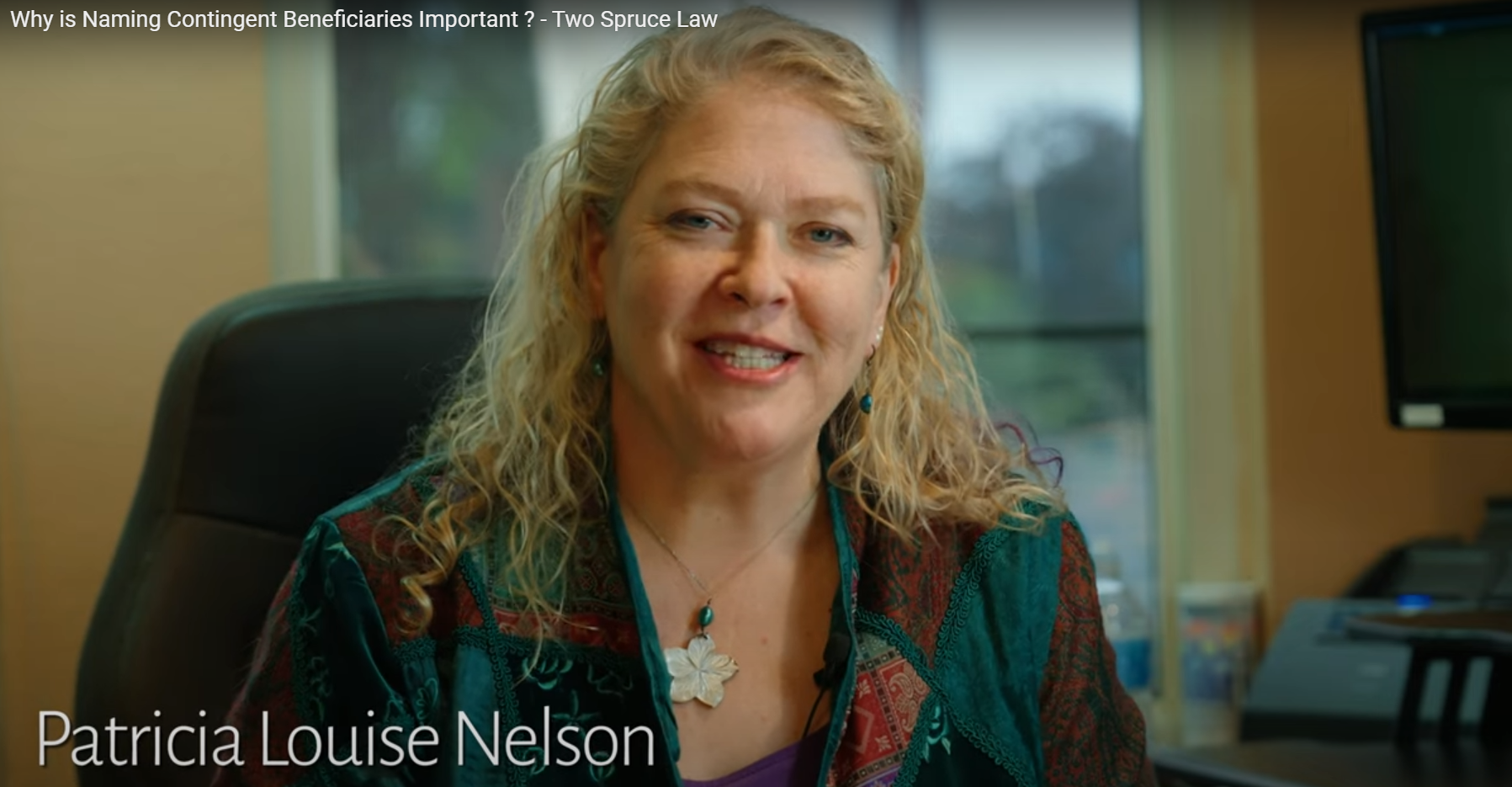
Why Is Naming Contingent Beneficiaries Important?
By Patricia Louise Nelson
Many of my client express frustration when I ask “So, if your spouse, all of your children, all of their children, and everyone else below you on your family tree dies before you, whom or what would you like to benefit from any remaining assets?” The most common response is “Come on! That is so unlikely that it’s ridiculous!!” I agree.
And yet, it could happen . . . .
If it does, Oregon statutes say who gets your assets. The people specified in the statues may be family members whom you do not wish to benefit. Or they could simply be people you do not know, have never met, and are certainly not unhappy that you have died. We call these beneficiaries “laughing heirs.” Why leave your assets to strangers?
Or worse . . . .
If no one qualifies as your heir under the Oregon statutes, then your remaining assets go to the Oregon Department of State Lands. I have yet to have a client intentionally give their assets to the State of Oregon.
So, I encourage you to name more distant family members or friends to take in this unlikely situation. AND, name someone to stand in line behind them if they too are not then living. At the end of that line, I encourage you to name a charity or charities to take the assets. That way, your assets benefit someone or something you like rather than passing to strangers or the State of Oregon.
Find out more at: https://twosprucelaw.com/videos/why-is-naming-contingent-beneficiaries-important
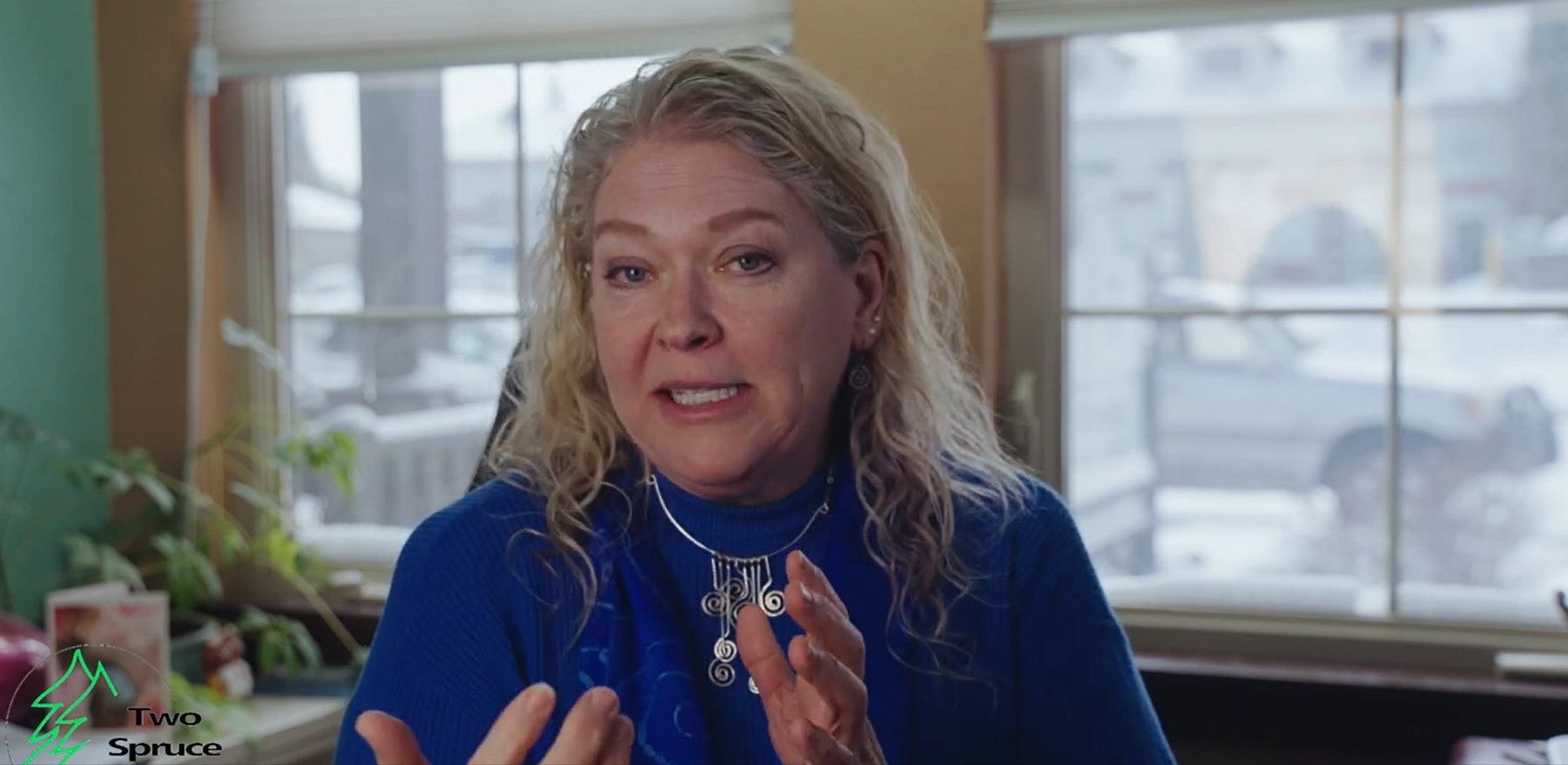
What Are Letters Testamentary? How Do I Avoid Probate?
What Are Letters Testamentary? How Do I Avoid Probate?
By Patricia Louise Nelson of Two Spruce Law
Many, if not most, of my probate matters begin with a phone call to my office. The caller very often begins by saying, “My mom (dad, sister, brother, or friend) died. Her banker (investment advisor, or realtor) says I need ‘Letters Testamentary’ before I can access her bank account (investment account, or sell her real property). What is that? I definitely want to avoid probate. Can you help me?” I always feel a bit of sadness for the caller as I explain that Letters Testamentary is the document the court issues when it opens a full probate, so the two questions are mutually inconsistent. Probate is the court oversight of the administration of an estate when the owner of the asset dies, with or without a will. If you really need Letters Testamentary, that means you need to take the assets through probate.
The professional advising the caller that they need Letters Testamentary may not be right. Because probate is a significant undertaking with substantial costs, it is important to explore all alternatives that may be available. Give us a call, let’s figure out whether you really need Letters Testamentary.
Now that we’ve covered what probate is, here are some frequently asked questions about probate:
1. How can I pay for probate when I have no money and I can’t access my deceased loved one’s bank account? Excellent question! This is a common predicament. Obviously you’ve done some homework. If you really need help paying the upfront costs, we can advance those for you until you are appointed as the Personal Representative and can access the decedent’s bank account to repay us. The attorney fees in probate are not payable until the court approves them at the end of the process. Generally attorney fees are paid from the estate assets.
2. How long with probate take? The typical probate in Oregon takes 6-9 months. Sometimes they take longer, depending on the situation.
3. When do I get the stuff left to me in the will? The court must approve distributions from the estate. The general estate is usually distributed at the end of the probate. Sometimes we can get court approval for an earlier distribution, but often not until the probate has been open for 5 or 6 months.
4. How does probate work without a will? When there is no will, the probate process is the same except that the assets go to the heirs of the decedent rather than to named beneficiaries. The heirs are generally people related to the decedent by blood or marriage. We can help you figure out the heirs, give us a call.
5. Can I file probate without an attorney? Technically, yes. It is a very significant undertaking. We recommend you use an attorney right from the start to avoid heading down the wrong path.
Find out more at: https://twosprucelaw.com/videos/what-are-letters-testamentary-and-5-more-common-probate-questions
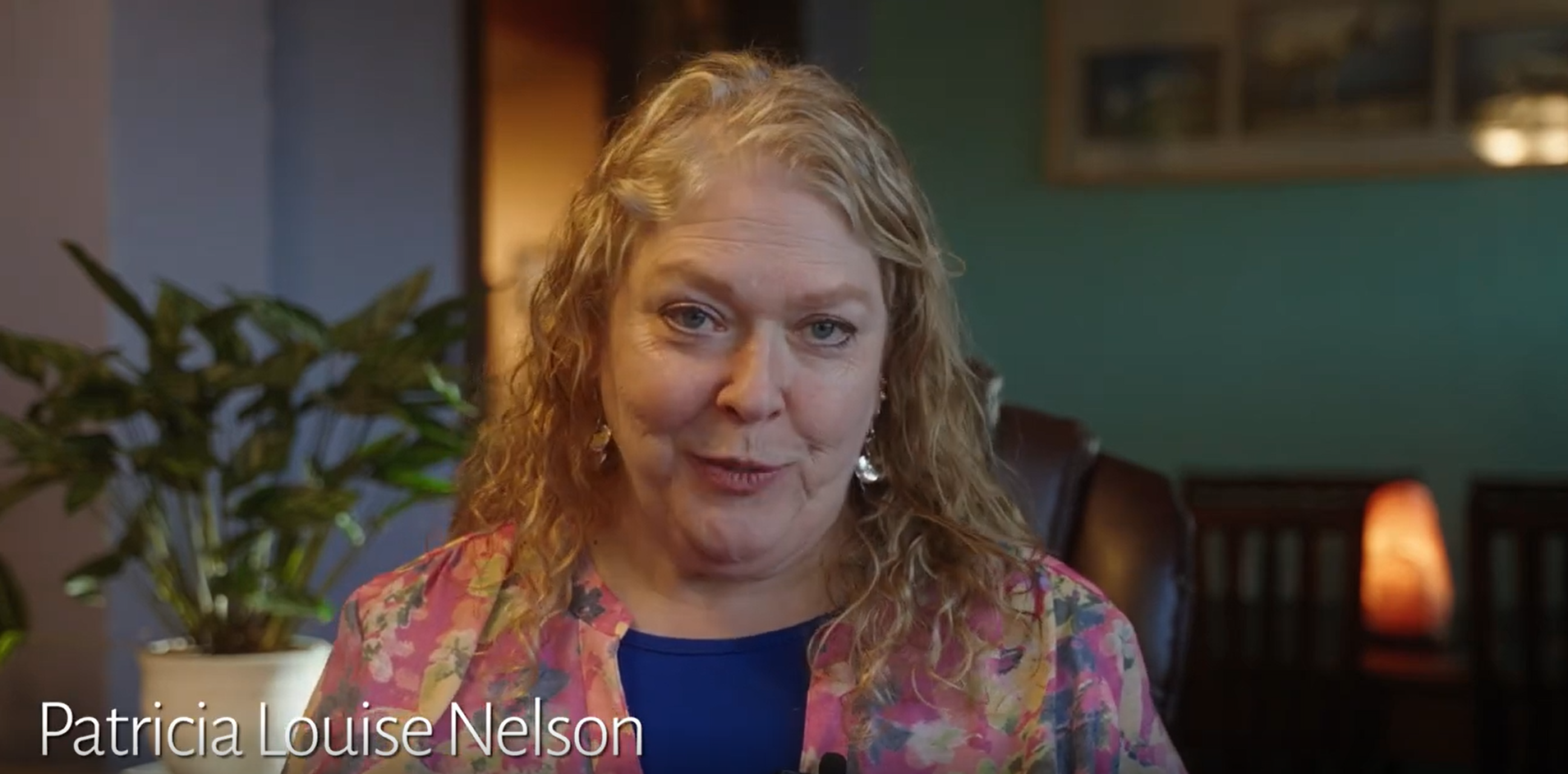
How to Nominate a Guardian in Your Trust
Guardians for Yourself
A guardian is someone who is appointed by the court to protect and care for the health and well-being of an incapacitated person.
To initiate the appointment of a guardian, a petition must be filed with the court and notice given to all interested persons, which includes yourself, should you become incapacitated. The petition can be filed by any person who is interested in your wellbeing. That person must prove by clear and convincing evidence that you cannot make your own healthcare decisions.
You can nominate someone to serve as your guardian in your Will. You can also include details about why you think that person would be a good guardian for you. Keep in mind, this is a recommendation to the court. Although your nomination of a person is not a guarantee that they will be appointed, it does carry weight in the court’s decision process.
It is important to take great care in who you nominate, including any alternates, as they may have control over where you live, what health care you receive (and don’t), and your general care and comfort. Consider people who know what kind of care you want and do not want, what you most value about your life, what is important to you, your spiritual beliefs, and your preferred place of care.
Also consider whether that person will have the time or capacity to serve as your guardian. You never know what stage of life incapacity may arise or for how many years you may require the help of a guardian. Also, sometime the decisions that need to be made can be involved or difficult, like those concerning life support measures. Make sure your guardian will not be swayed by their own emotions or beliefs and will stay true to your wishes.
It may be best to have a conversation with those you are thinking of nominating to see if they would be a good fit. Bear in mind that if you tell the person that you plan to nominate them, and later change your mind, it can feel awkward to tell them you changed your mind. It can feel awkward not to tell them too, when you know they think they are nominated.
Give us a call to talk more about guardians and how to pick the right person for you.

Is Having a Will Really Having an Estate Plan?
Is Having a Will Really Having an Estate Plan?
By Patricia Louise Nelson of Two Spruce Law
Sometimes I hear “I have a Will, so I have an estate plan.” I agree – to a point. Certainly, a Will constitutes part of an estate plan. If all you have is a Will, I would not argue that you do not have an estate plan. I would argue that you have an incomplete estate plan.
In my opinion, an estate plan is more than a Will. A complete estate plan includes a power of attorney, an Advance Directive, and, very likely, a revocable living trust. Bear in mind that a Will requires probate. A Will does not avoid probate.
Saying you have an estate plan when you just have a Will is like saying you have a car when really what you have is an engine. A trust, on the other hand, is like a full car – engine, transmission, body – the whole thing. That is because a trust can get itself to the beneficiaries after the death of the owner without the assistance of probate.
A Will needs probate, so it is like an engine outside of a car. It needs probate – arguably probate provides the transition and body of the car – to get the assets to the beneficiaries after the owner dies. Leaving assets outside a trust intentionally (like when you just have a Will) or unintentionally is sort of like having to call a tow truck to help take the assets to where they need to go.
Let’s avoid calling the tow truck! Give us a call.
Find out more at: https://www.twosprucelaw.com/videos/is-having-a-will-really-having-an-estate-plan
#TwoSpruceLaw, #oregonwomeninbusines, #womenownedbusiness, #estateplanningattorney, #probateattorney, #probate, #estateplan, #willsandtrusts, #financialfreedom, #inbendoregon, #centraloregon, #pnw, #estateplanning101

Common Probate Problems with Horror Stories!
Common Probate Problems with Horror Stories!
By Patricia Louise Nelson of Two Spruce Law
I have often said “use an experienced estate planning attorney” rather than doing an online estate plan or using a general practitioner to prepare your estate plan. Now I want to talk specifically about why I make that recommendation. Here are three common issues we run into in our probate practice.
Improperly signed documents
To be a valid Oregon Will, a document must be signed by the person creating it in front of two witnesses. The witnesses need to see the person creating the document sign it and see each other watch that person sign it. We often are confronted with improperly signed documents.
Sometimes that is due to the documents complying with the laws of the state in which they were signed, but do not meet the requirements for Oregon. This is true, for example, with wills created in California. California requires two witnesses but does not require them to swear to their witnesses, so the actual signing complied with Oregon law but the documentation does not comply. This is often a relatively easy fix in that we can locate one of the witnesses and get that person to sign a document that brings the will into compliance with Oregon law. Of course, hunting down the person and preparing the document for them to sign costs time and money. But it often can be done.
Sometimes the person creating the will had their signature notarized, but not witnesses. In that case, the notary can serve as one of the two required witnesses. If another person happened to be present, we can use that second person as the second witness. Again hunting down the people who were present and preparing documents for them to sign to get the document to comply with Oregon law costs time and money.
If the person got their signature notarized but no other person was present, or if a document has only one witness, or if a document has no witnesses, then we may still be able to get in probated in Oregon. Under a fairly new Oregon Statute, we can ask the probate court to accept a non-conforming document, if we proceed with a formal form probate. A formal form probate means that we request the court to accept the writing, give notice to all people who might be affected by implementing the writing as the will, wait 21 days to see if anyone objects, and then get appointed as the person in charge of the probate. This process causes delay due to the 21-day waiting period and expense in preparing the special petition to try to get the writing accepted as a will.
Ideally, a will will have two witnesses who provide documentation at the time they witnessed the will so that we can avoid these extra expenses and complications.
Written on documents
As part of our estate plan drafting process, we advise clients to never to write on their documents to try to change them. Surprisingly frequently in our probate practice, we will face a will or will-like document that is written on. Sometimes these markings are initials and/or dated. Regardless of whether they are initialed and/or dated, it is a bad idea to write on a will.
Historically, wills that are written on after they were signed were deemed to be revoked, even if the writing on the will is limited to crossing out one name and writing in another name. Modernly, these sorts of attempted changes result in being in legal limbo. Legal limbo is expensive to get out of, expensive financially and emotionally. We will get out of legal limbo one way or another, but let’s avoid it – don’t write on your documents!
Incomplete dispositions
Another issue we occasionally run into in our probate practice is when a document that qualifies as a will (one way or another) says who gets certain assets but fails to say who gets other assets. In these situations, the person who died says who gets certain items but intestate succession laws control who get the assets that are not mentioned or described in the will.
Sometimes these issues are the result of a mistake, sometimes by an attorney who has a very general practice and dabbles in estate planning. Sometimes these issues result for assumptions made by the attorney drafting the documents. Specially these issues can arise in a situation where the person who created the document had limited assets at the time the document was created, say, for example, a house and an IRA. The person drafting the document assumed that would remain the case. So the will says “my house goes to my daughter.” But after the will was signed, the person sold their house. They no longer owned a house when they died. As a result, the remaining proceeds form the sale of the house go by intestate succession laws rather than to the daughter.
Find out more at: https://www.twosprucelaw.com/videos/common-probate-problems-with-horror-stories
#TwoSpruceLaw, #estateplanningattorney, #attorneys, #probateattorney, #bendoregon, #avoidprobate, #estateplan, #bestofbend, #sunriveroregon, #smallbusinessoregon, #oregonbusinesswomen, #womenownedbusiness
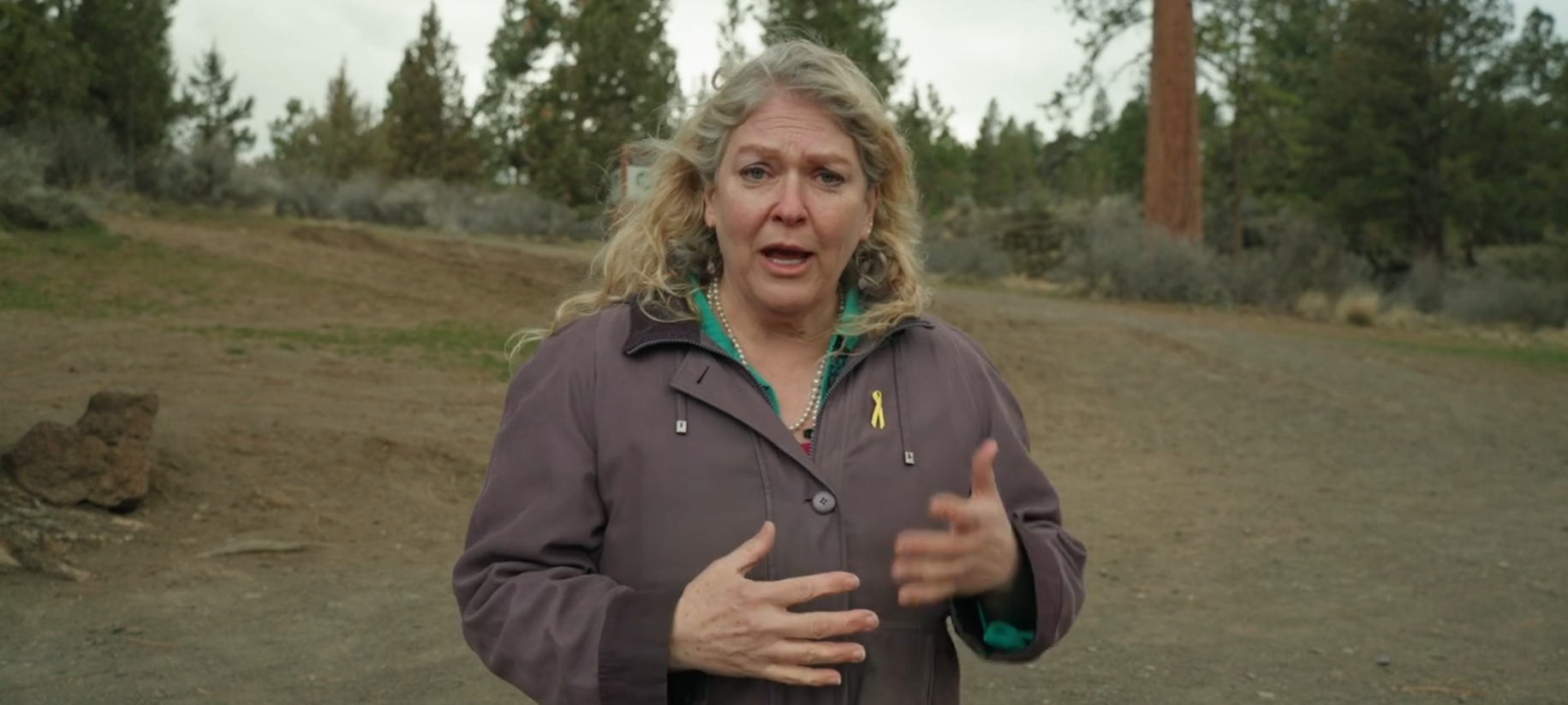
Turmoils of Estate Planning
By Patricia Louise Nelson
Contemplating doing an estate plan can feel really complicated. That’s because it IS COMPLICATED!!
We do our level best to make this complicated process approachable and manageable. We often even make it fun! And we still cover as many variables as possible.
Use an experienced estate planning attorney to avoid unnecessary complications in the administration of your estate when the time comes. You can save hundreds of dollars on a less expensive approach, only to pay thousands of dollars more than you should have in the implementation of your estate. Don’t be penny wise and pound foolish. Use an experienced estate planning attorney!
#TwoSpruceLaw, #estateplanningattorney, #bendoregon, #centraloregon, #wills, #probate, #estateplanning, #law, #financialfreedom, #legal, #money, #personalfinance, #womenownedbusiness, #oregonbusiness,
Find out more at: https://twosprucelaw.com/videos/turmoils-of-estate-planning

Myths About Estate Planning
Myths About Estate Planning
By Patricia Louise Nelson of Two Spruce Law
There are many myths circulating about estate planning. This article discusses a few of them.

Beware of Powers of Attorney
Powers of attorney are powerful documents that can be misused. It is a crime to use a power of attorney for your own benefit, unless it specifically authorizes that. It is a crime because, it happens. If it never happened, there would be no need to criminalize it.
The worst case I personally was involved in involved a lady in her late 80s. I got involved when her son stopped paying for her care at a memory care facility. The Oregon Department of Human Services began an investigation. They asked me to get involved. I got a professional fiduciary appointed to take over the lady’s finances.
I documented over $680,000 that a son took from his mother using a power of attorney she had given him. He seemed to think investing in real property with small down payments was wise in 2006 and 2007. By the time we got involved, the bottom had dropped out of the real estate market. Mom’s money was gone. Son did us the favor of purchasing himself an airplane and hanger with Mom’s money, so we were able to get back some of what he had taken. The cost of the litigation was more than $40,000. The situation was tragic.
Be very, very careful about whom you give a power of attorney over your finances.
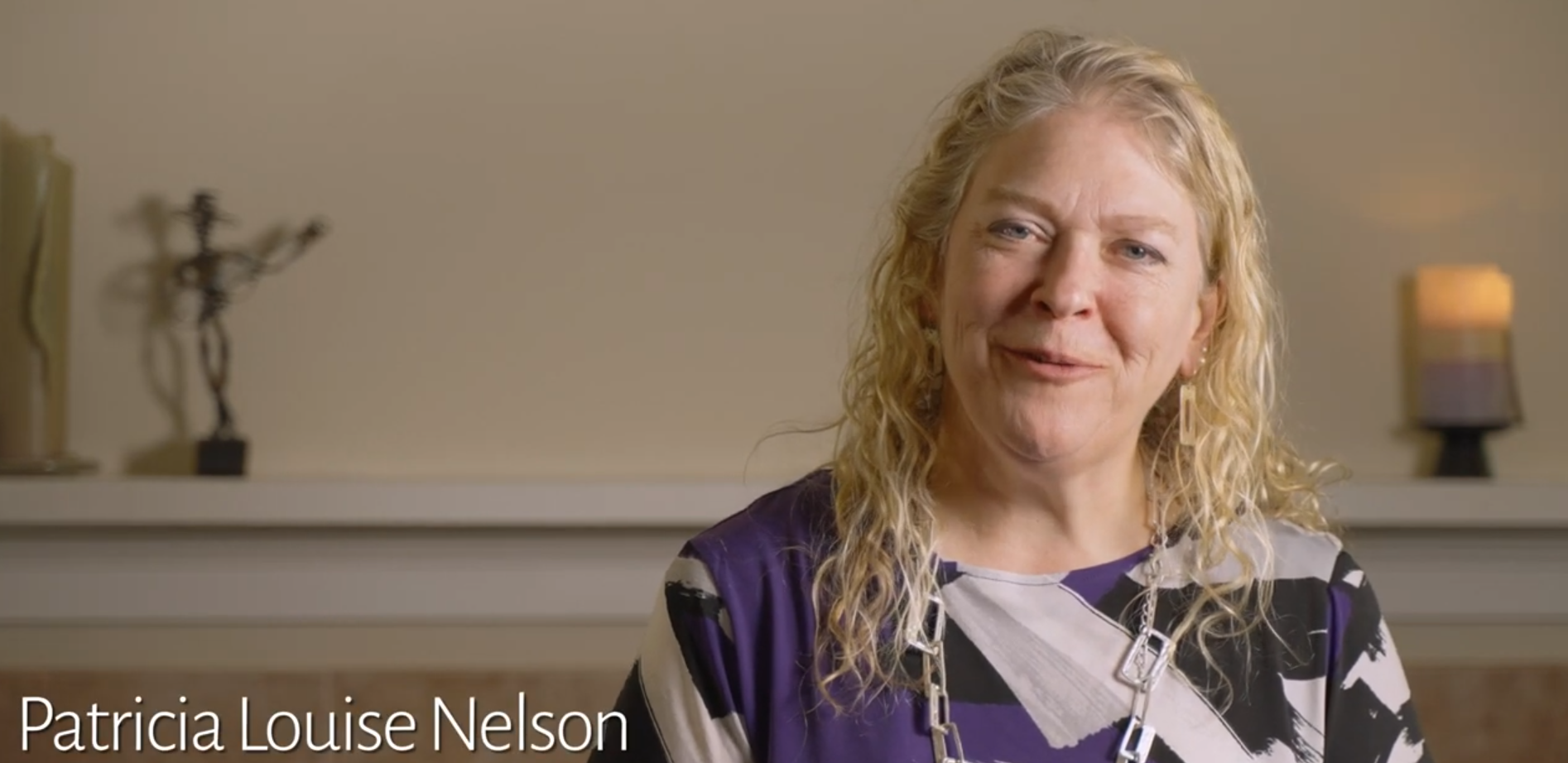
How Much Will You Charge Me to Update My Estate Plan?
Attorney Patricia Louise Nelson from Two Spruce Law in Bend, Oregon discusses whether its wise to use her to update your estate plan. I am often asked “I have a trust from years ago. It’s pretty outdated, but I don’t think it needs a lot of changes. What is involved in updating it?” I believe this is a code question for what may be the real question: “How much will you charge me to update my estate plan?” Of course, the answer is nearly always “It depends.” If I prepared your current documents, it will be less expensive for me to make minor revisions to them. If the documents were originally prepared by someone else, it often takes more time to make minor changes than it would for us to start over with fresh documents. When an attorney makes a change, even what seems like a minor change to documents prepared by someone else, we assume responsibility (and liability) for any mistakes that are hidden in the original documents. When making changes to documents with which I am not familiar, I must invest a great deal of time to be sure that I am aware of all of the ramifications of each change. That means thoroughly and carefully reading the entire document while paying attention to the interplay between different provisions. This is not as necessary when I know the documents because I prepared them. So, often the least expensive way to make changes to a document like a revocable living trust is to start over. By start over, I do not mean revoke the old trust and create a new one. I mean that we can prepare a “restatement” of the trust. It replaces all of the terms of the existing trust without revoking it. The benefit is that the trust is updated AND all of the assets that were in the trust when we started are still in the trust after the restatement in completed. Two Spruce Law offers free phone consultations, and I will give you a flat fee quote during that meeting. Schedule yours today to find out the best way (and cost) to update your estate plan.
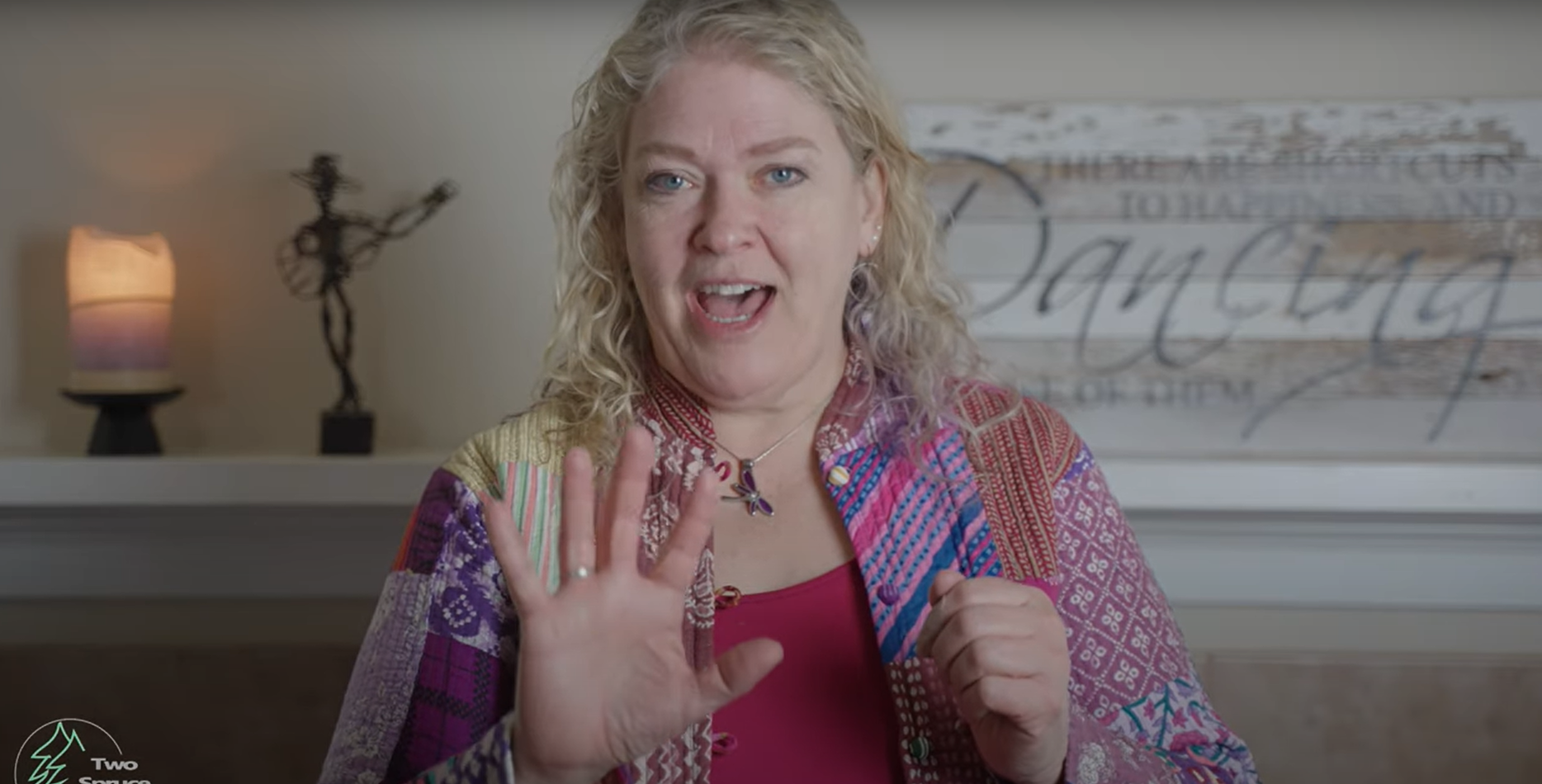
5 Frequently Asked Questions About Estate Planning By Patricia Louise Nelson
As an estate planning attorney, I often hear similar questions again and again. This article is designed to ask and answer 5 of those questions.
1. What makes an Estate Plan? An estate plan is a series of documents designed to convey your wishes to provide for you during your lifetime, even if you are incapacitated, and to provide guidance about what life support you might like in different situations, and to provide how you would like to dispose of your body when you’re done with it. Ideally, it is complete and thorough.
It is likely made up of a revocable living trust, a will, a power of attorney, an Advance Directive, and a document by which you appoint someone to be in charge of disposing of your remains and providing that person with your wishes.
2. Do I need a will if I have a revocable living trust? Yes, nearly always. A revocable living trust controls what happens to your assets owned by the trust when you die. It is possible that some assets could be left outside the trust, either inadvertently or on purpose. Regardless, if those assets cannot be accessed by your person in charge or one or more beneficiaries, a probate will be needed to process those assets. To ensure that your revocable living trust has control over these probate assets, you will need a “pour-over will.” A pour-over will is one that has your trust as the only beneficiary. It is the last way to get assets into your revocable living trust. It requires probate, which is expensive. So, while I recommend that you have a pour-over will, our plan is that you will never use it.
3. What is the most important part of my estate plan? It depends. If you are alive but incapacitated, it is likely that the most important part of your estate plan is your power of attorney and your revocable living trust. If you have died, the most important document in your estate plan may be your will and/or your revocable living trust. If you are near death, it is likely that the most important document could be your Advance Directive. Generally speaking, the most important document overall in an estate plan is often the revocable living trust, because it controls your assets while you are alive and after you have died.
4. What is my estate? This is a common question. Many people think of an “estate” as the assets of a rich person. Actually, an estate is whatever you own. It could be a car and some tangible personal property. Or a car, some tangible personal property, and a bank account. Perhaps your estate also includes a house. Maybe a retirement account or two. And a life insurance policy. Basically, your estate is everything you own.
5. Why hire an attorney to work on an estate plan? You don’t have to. I do, however, recommend that you use an attorney. You know that feeling “I don’t even know what questions to ask.” An attorney can help you not only ask the right questions, but also answer them. You maybe be able to save hundreds of dollars drafting your own estate plan. In my experience, self-made estate plans often cost hundreds or even thousands of dollars more to implement when the time comes simply because you do not know what you do not know. You therefore cannot prevent confusion and arguments caused by your documents. Confusion and arguments are expensive.

How to Deal with Divorce in Your Estate Plan
By Patricia Louise Nelson of Two Spruce Law
There are a couple of times you when being divorced and being in the process of getting divorce justifies updating your estate plan. One situation is if you are getting divorced and you want to avoid your soon-to-be-ex-spouse from receiving any of your assets. The other situation is if you get divorced after putting in place an estate plan that benefits your former spouse.
During the process of divorcing, you are allowed to prepare a new estate plan intentionally giving your spouse nothing, if you are no longer living together as a married couple. If you need to live together as a couple, your soon-to-be-former spouse is entitled to an “elective share” under Oregon law. The elective share is a portion of your assets. It is a sliding scale, which depends on the length of the marriage. The longer the marriage, the higher percent of your assets to which your spouse is entitled. Give us a call so we can help you figure out how the Oregon elective share impacts your situation. Of course, if you have a prenuptial agreement, you are likely allowed to leave nothing to your former spouse, depending on the terms of the prenuptial agreement.
The second situation is if you get divorced after your estate plan is in place. In this situation, the provisions in the estate plan naming the now-former spouse as a fiduciary or giving the now-former spouse assets are revoked by the divorce process. The estate planning documents do not need to be changed unless you want some other terms changed – the spouse is removed by the divorce paperwork. Often, the estate plan needs to be updated for other reasons, so if you are not sure then call us to discuss the terms of your estate plan in light of your divorce.

How to Pick a Guardian for Your Children
It is extremely important for parents to select a guardian to nominate to raise their children if the parents die before the children are all at least age 18. I want to be clear, I am very carefully using the word “nominate.” I am not using the word “appoint.” Under Oregon law, a parent nominates a guardian. A court ultimately appoints a guardian if one is ever needed. The court gives great weight to the parent’s nomination. But it is not the only factor a court may consider in selecting the guardian.
A court may even decide not to appoint the person nominated by the parent. Sometimes the person the parent nominated is no long able to serve as the guardian due to health or other person issues. Because that may be the case, I strongly recommend that my client who are the parents of young children state in their will WHY they selected the people they nominated to seThose reasons might include that the people live in a certain town (or don’t live in a particular town); that they people practice a specific religion (or don’t); that they have children my client’s children’s ages (or don’t); that they follow a certain personal philosophy (or don’t); that the prospective guardian will cultivate a relationship with blood relatives (or protect the minors from contact with certain blood relatives for good reasons). The potential reasons are limitless – but very important. Tell the court why you chose to nominate the people you chose so that the court can take into consideration those factors in the process of naming the guardian for your children.
Find out more at: https://www.twosprucelaw.com/videos/how-to-pick-a-guardian-for-your-children

What is Probate?
What is Probate?
By Patricia Louise Nelson of Two Spruce Law P.C.
I am often asked “What is probate?” Probate is the court implementation of an estate when someone dies. I want to answer several common questions about probate.
The most frequently asked question is “Just a second. The person who died had a will. Doesn’t that avoid probate?” Unfortunately, it does not. A will can specify who receives assets, but it has no ability to implement itself. A will needs probate to implement it. On the other hand, a revocable living trust – if it is properly managed – does work to avoid probate
So why avoid probate? Well, there are three primary reasons to avoid probate in my mind. One, it is public, anyone can go to the courthouse and access the probate file. That file will include information about heirs and devisees, assets, and other private information. For many people, that alone is enough of a reason to avoid probate.
Another drawback of probate is that it is time consuming. Even with a firm like Two Spruce Law that does a lot of work in probate, it takes 7-9 months to complete the process. Most of that time is caused by required notice periods in the Oregon Probate Code.
The third drawback of probate is that it is expensive. It very frequently costs $6-8,000 in attorney fees plus another $1,350 in other costs such as court filing fees, publication costs, and recording fees, to complete the probate process.
In certain limited circumstances, subjecting an estate to probate is worth doing despite the drawbacks of probate. Specifically, probate has the effect of “cutting of claims of unknown creditors.” Say what? Because part of the probate process is publishing notice of the probate in the tiny print in the back of the newspaper, all creditors about which we may not be aware of are limited to presenting their claims within 4 months of the date of first publication or they are limited to the insurance the deceased person had; they cannot expect payment from the deceased person’s assets after that timeline. Bear in mind that these are “unknown” creditors – we cannot ignore creditors we know about and hope they are limited in a similar way. There are other ways of dealing with known creditors and even suspected creditors. So, call us if you know about a creditor you want to avoid in a probate.
Do you have to have an attorney to complete a probate? The technical answer is “no.” The practical answer in Oregon is “I think you should.” Oregon’s probate code is not simple or easy to comply with without an attorney. We do not charge for initial calls about probates, so give us a call to see if we might be a good fit for you and your situation.
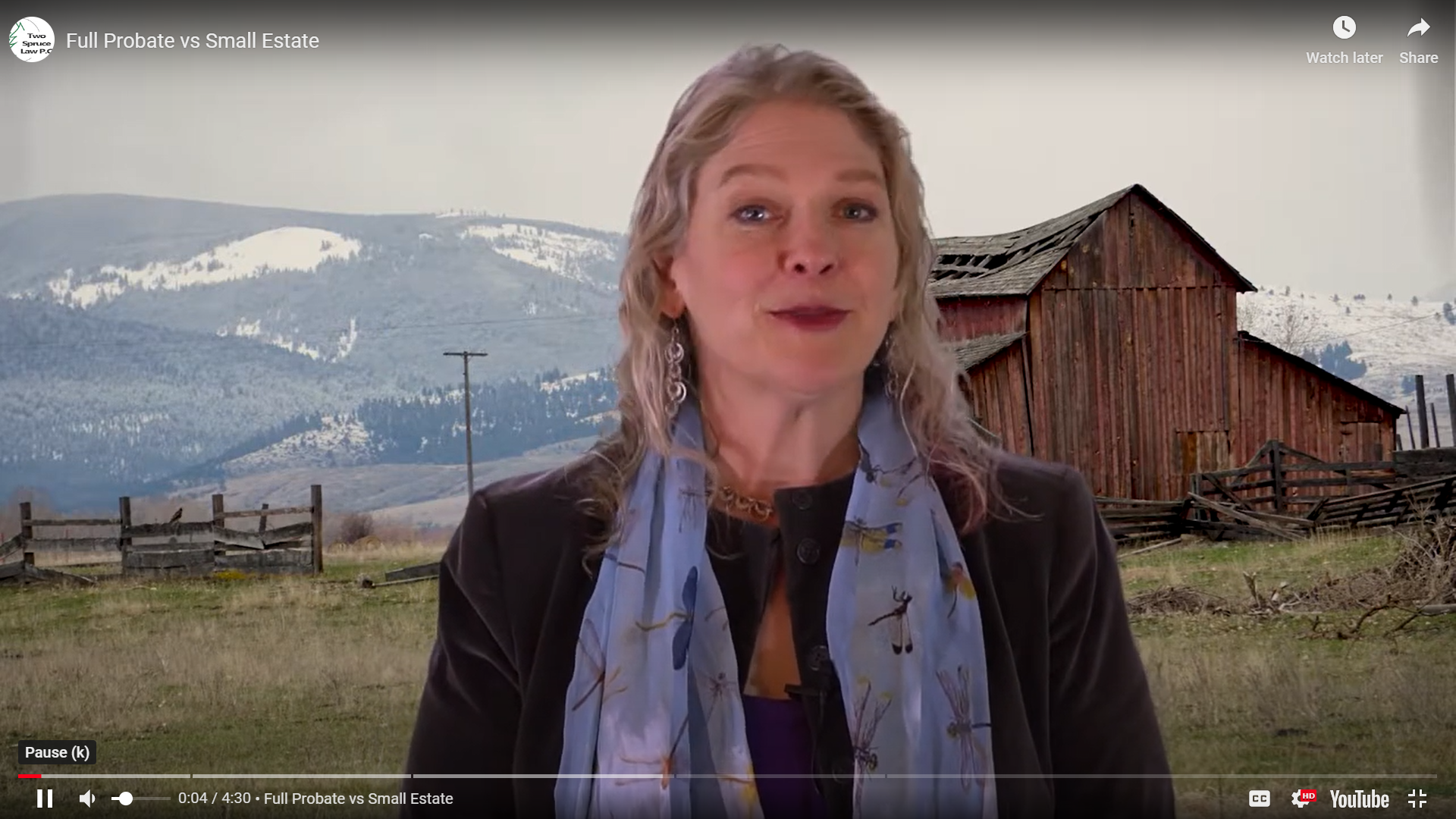
Full Probate vs. Small Estate (Which is Right for You?)
By Patricia Louise Nelson of Two Spruce Law
In Oregon, we have two types of probates. One is called a small estate proceeding, which starts with the filing of an Affidavit of Claiming Successor. The other is generally referred to as a full probate. A small estate proceeding is less expensive, simpler, and takes less time than a full probate. It is vital that when starting a probate, we start with the right kind of probate. Starting with a small estate and later having to start over with a full probate is more expensive than starting with a full probate. There are three primary reasons an estate must go through a full probate rather than a small estate proceeding. Please bear in mind that that probate is only necessary if there are assets held in the name of a person who has died and there is no co-owner or beneficiary designated for those assets.
Under Oregon law, an estate must go through a full probate unless the value of the real property is $200,000 or less and the value of all other property (like bank accounts, investment accounts, cars, manufactured homes that are not part of the land, other tangible personal property – everything except land) is $75,000 or less. These value limits are one of the top three reasons an estate must go through a full probate.
As a practical matter, a small estate is only for very simple situations. The statutes allowing for a full probate give the person in charge full authority to deal with a multitude of different situations. These situations include things like evicting people on the estate’s real property, asking the court for clarification of the meaning of a provision in the Will, objecting to someone who claims the person who died owed them money, and many other matters. On the other hand, the small estate proceeding is simply designed to transfer the assets listed in the Affidavit of Claiming Successor to the people listed to receive them, subject to the debts listed in the Affidavit. If the situation involves anything odd, it is likely best to start with a full probate even if the value of the assets allows the estate to qualify for a small estate proceeding.
The third primary reason for filing a full probate even if the estate otherwise qualifies for a small estate proceeding is that selling real property from a small estate can be very cumbersome, sometimes even impossible. Under the small estate proceeding statues, if the person who filed the Affidavit of Claiming Successor wants to sell the real estate during the first four months after filing the Affidavit, all of the heirs must sign the deed along with the Affiant. Even if an heir is disinherited under the Will of the person who died, that heir must sign the deed. Sometimes the heirs are not yet age 18 so they do not have the legal capacity to sign a deed. These circumstances can make selling the real property impossible. Once four months have passed from the date the Affidavit was filed, the person who filed it must sign a deed transferring ownership of the real property to the beneficiaries – if those beneficiaries are minors, there is no way to sell the real property until they turn 18 with a small estate proceeding. In a full probate, the person in charge can sell the estate’s real property without anyone else signing the deed.
Call us today to find out more!
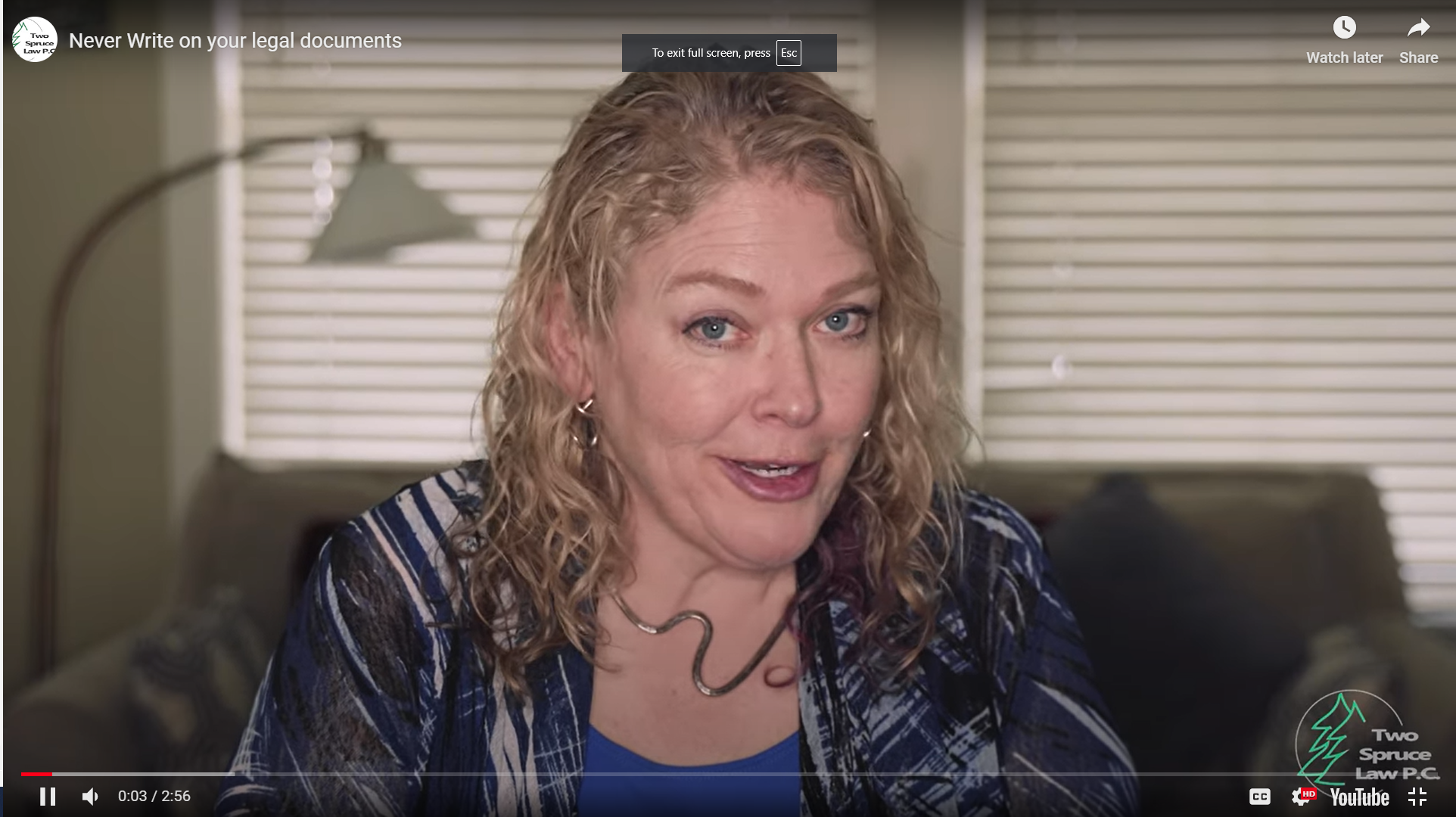
Never Write on Your Legal Documents
By Patricia L. Nelson
It is important to leave your estate planning documents unmarked. Let’s pretend that you named your sister from Toledo, OH, as your successor trustee. Your sister later gets married and changes her last name. She and her new husband delight you by moving to Bend, OR. Let’s also pretend that your father, who is named as your alternate successor trustee, does not approve of his new son-in-law.
It can be tempting to “correct” documents by writing a line over your sister’s former last name and neatly writing in her new last name and crossing out “Toledo, OH” and writing in “Bend, OR” as her location. Please do not do that.
Crossing out your sister’s name can lead to arguments that you did not simply mean to update her information. The argument might be made that you intended to remove her as your successor trustee. This would result in your father being the trustee of your trust rather than your sister. While I think it is likely that such an argument would not be successful (but it might), arguments that involve courts making decisions are expensive. Arguments are not just financially expensive; they can lead to life-long fractures in families. Please do not write on your estate planning documents.
There are two general exceptions to this rule. One is the Advance Directive. You may update contact information on this document. If you do, please make sure your local hospital and your personal physician have copies of the updated version.
The second exception are schedules to your trust. If you have a schedule to your trust that indicates, for example, who is to receive which items of tangible personal property, you may change this document. If you do, be sure it is clear and that each item is designated to go to only one person. Again, a lack of clarity can result in arguments. Arguments are financially and interpersonally painful.
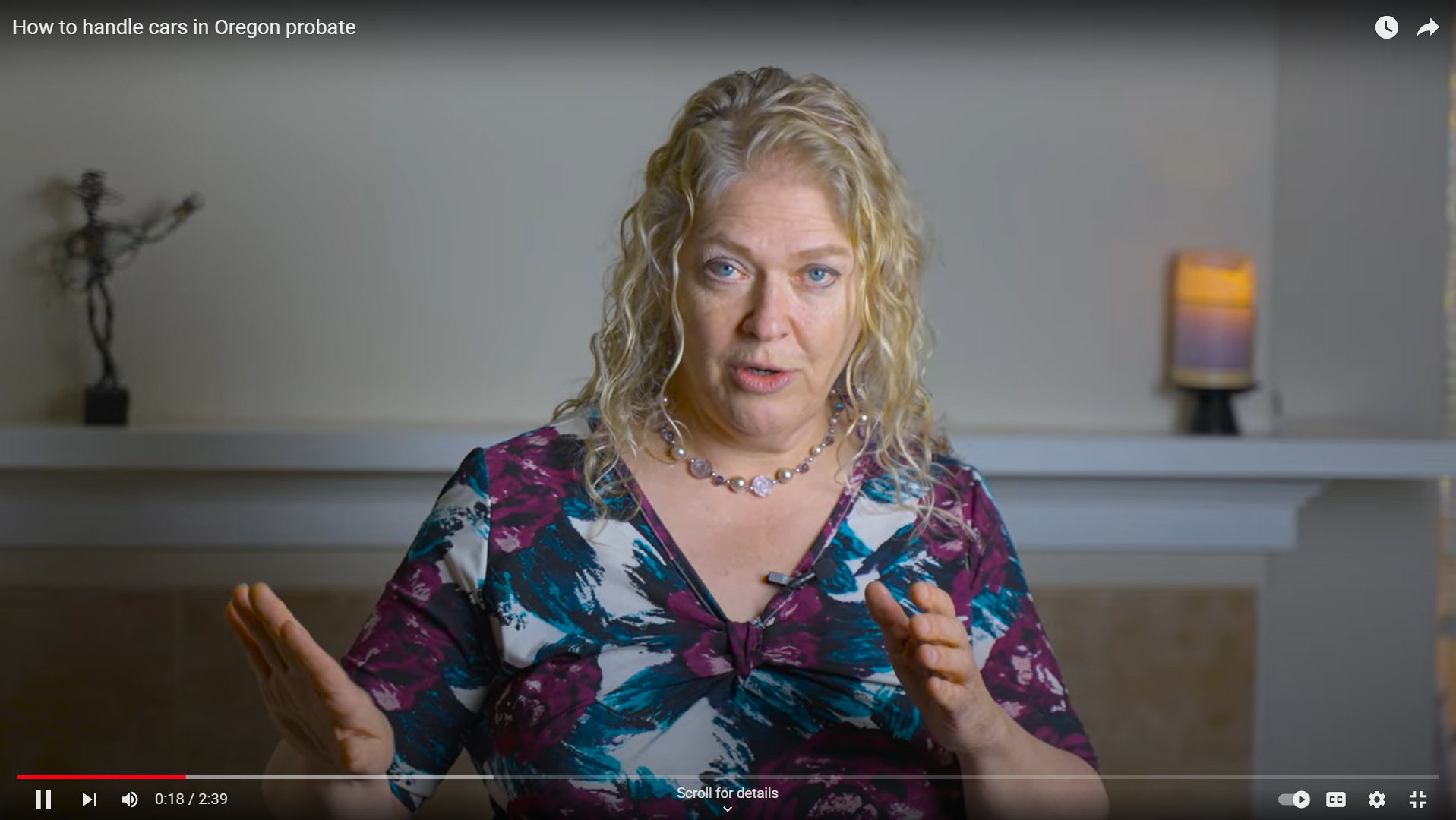
How to Handle Cars in Probate
By Patricia Louise Nelson of Bend, OR
Many probates include cars. A car is to be included in the probate process if the person who died owned an interest in the car without right of survivorship to a co-owner or owned it alone. Including a car in the probate process means listing it on the inventory at fair market value. You can document fair market value by researching it online. Save the results of your research to document the value of the vehicle as close to the date of death as possible. Generally speaking, the value of vehicles decreases over time, so it is important to preserve the proof of value that you find.
Do not return vehicles to the lienholder unless you have written documentation that the lienholder will not seek a deficiency. Having a vehicle on which the decedent owed more money than the vehicle is worth is a problem. But returning that vehicle to the lienholder so the lienholder can sell it and seek a deficiency against the decedent’s estate is a bigger problem. Try to sell the vehicle, even if you have to accept less than the amount owed on it. That is the least expensive approach – unless the lienholder is willing to accept the vehicle back and assure you in writing that it will not seek a deficiency.
Ideally, you will sell the vehicle to an independent third party during the probate. Hopefully the amount you receive for the vehicle will be close to the fair market value you documented. Another option is to hold the vehicle for the probate period; perhaps disabling the vehicle so no one can drive it.
Of course, there are circumstances where a beneficiary of the estate needs to drive the vehicle. If you know that person is not a safe driver, do not let them drive the estate’s vehicle. If you decide to allow a beneficiary to drive the estate’s vehicle, sign the title over to that person reserving a lienholder interest for the estate. Have the person sign a custodial receipt for the vehicle. Ensure that the person insures the vehicle, naming the estate has an additional insured. Once the probate is complete, you can sign off as the lienholder and turn the vehicle over to the person who has been driving it.
In any of these options, be sure the vehicle is insured and disclose to the insurance company that the owner has died.
Find out more at: https://www.twosprucelaw.com/videos/cars-in-probate

Personal Representative Duties
Personal Representative Duties: Trustee’s Duty to Use Special Skills or Expertise
By Patricia Louise Nelson of Two Spruce Law
In addition to many other duties, trustees have the duty to use any special skills or expertise for the benefit of the trust. When a trustee who has special skills or expertise, or is named trustee in reliance upon the trustee’s representation that the trustee has special skills or expertise, that trustee must use those special skills in administering the trust. For example, a CPA is serving as the trustee could be expected to know about and use all tactics available to the minimize the trust’s tax liability.
Also, trustees are allowed to delegate duties and powers that a “prudent trustee of comparable skills” could properly delegate under the circumstances. Of course, that leaves a couple of big questions. Like what is a prudent trustee of comparable skills? And under what circumstances could such a person delegate? This rule is applied on a case-by-case basis. So, if the trustee wants to take a weekend and go drinking on a fishing boat, she may be allowed to delegate her duties for that weekend but probably not to one of her drinking buddies.
In making delegation decisions, the trustee must exercise reasonable care, skill, and caution in: selecting the person to whom they are delegating; establishing the scope and terms of delegation, consistent with the terms of the trust; and review the agent’s actions from time to time in order to make sure they are doing a good job with the scope of the delegation.
Note that the person to whom the trustee delegates duties owes a duty to the trust to exercise reasonable care to comply with the terms of the delegation.
We are here to help! Call us today for a free consultation.

What Are Letters Testamentary? How Can I Avoid Probate?
What are Letters Testamentary? How Do I Avoid Probate?
Many, if not most, of my probate matters begin with a phone call to my office. The caller very often begins by saying, “My mom (dad, sister, brother, or friend) died. Her banker (investment advisor or realtor) says I need ‘Letters Testamentary’ before I can access her bank account (investment account or sell her real property). What is that? I definitely want to avoid probate. Can you help me?” I always feel a bit of sadness for the caller as I explain that Letters Testamentary is the document the court issues when it opens a full probate, so the two questions are mutually inconsistent. If you really need Letters Testamentary, that means you need to take the assets through probate.
The professional advising the caller that they need Letters Testamentary may not be right. Because probate is a significant undertaking with substantial costs, it is important to explore all alternatives that may be available. Give us a call, let’s figure out whether you really need Letters Testamentary.

How Do I Fill Out Oregon’s Advance Directive Form?
Ho to Fill Out Oregon’s Advance Directive
Introduction:
Oregon’s Advanced Directive allows you to appoint someone to make healthcare decisions for you, if you become unable to communicate your wishes to your doctor. It is crucial that every section of this important form be completed correctly. Let us go through it together.
Sections One and Two:
In sections One and Two, you fill in information about yourself and your healthcare representatives. The latest Oregon Advance Directive form requests all contact information for your healthcare representatives, including home, work, and cell phone number. Please provide all the information you can. The point of having an address on this form is so that the authorities can locate your healthcare representative in case of an emergency, including possibly knocking on their door. I would therefore recommend that you use physical addresses, as opposed to a PO box.
Section Three:
Section Three is where you need to make your first decision. You need to pick either the first choice or the second choice, but you cannot choose both. If you choose the first option, your health care representative must follow the instructions you provide in the balance of the document. The second option allows your healthcare representative to make decisions for you, using your instructions as guidelines. On the one hand, if a health care representative makes decisions that result in your death, that could leave the person with a sense of guilt. On the other hand, if you require your health care representative to follow your instructions, that leaves them with no discretion.
Section Four:
Section four gives you the opportunity to give directions regarding your end-of-life care.
Part A:
In Section Four, Part A, if you initial A, it’s a shortcut. It is the same as initializing “I do not want tube feeding” and “I do not want life support” under every choice in Section Four, Part B.
Part B:
Section Four, Part B covers four conditions: Close to Death, Permanently Unconscious, Advanced Progressive Illness, and Extraordinary Suffering. For each of these conditions, you can decide whether you want tube feeding, whether you want tube feeding only as your health care provider recommends, or whether you do NOT want tube feeding. In addition, you may make the same choices about whether you want any other life support that might be available to you.
Part C:
Section Four, Part C gives you an opportunity to provide your healthcare representative additional instruction. In the actual form this is a blank line. In our form, we have inserted an additional option. It is a reference to the Dementia Provision. The actual Dementia Provision is the last page of our draft Advance Directive. If you like that provision, you need to initial Section Four, Part C on the bottom of page four of the Advanced Directive form.
We have taken the Dementia Provision as it was drafted by Compassion And Choices. It allows you to decide now whether you want to be fed or given fluids if you have advanced dementia and you could potentially live for years if you were given a feeding tube and intravenous fluids. If you do not want to, you circle “do not” on each of these choices, sign and date the form.
As you can see, it is a tricky form. Please let us know how we can help you fill it out.